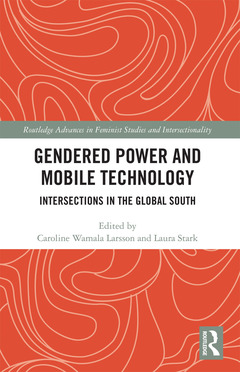Description
Gendered Power and Mobile Technology
Intersections in the Global South
Routledge Advances in Feminist Studies and Intersectionality Series
Coordinators: Wamala Larsson Caroline, Stark Laura
Language: English
Keywords
Young Men; mHealth Services; Gender; Development and Mobile Technology; Mobile Money Users; Laura Stark; Mobile Money; Caroline Wamala Larsson; Mobile Money Agents; intersectionality; Low Literacy Users; Linda Paxling; Feminist Technology Studies; Saayan Chattopadhyay; Uganda Communications Commission; masculinity; ICT Availability; mobile phones; Shuar Communities; Jukka Jouhki; Social Reproduction; India; HIV Positive Woman; Sirpa Tenhunen; Mobile Phone Features; class; ICT Adoption; gender; Young Rural Women; Michael Waltinger; Tech Hubs; Mireia Fernández-Ardèvol; ICT Community; Kenya; Send SMS Message; Peru; Mobile Money Account; Ecuador; HIV Counsellor; Yolanda Martínez Suárezy; Ghana Aid Commission; Saleta DeSalvador Agra; Low Literate Women; Ghana; Feminist Technoscience; Janet D; Kwami; Mobile Money Services; Mariana Barreto; Mobile Money Transfers; Andrea García; China; Chung-tai CHENG; Cameroon; Soazic Elise WANG SONNE; Mexico; Lorena Perez Garcia; Perpetual Crentsil; HIV; AIDS; Jakob Svensson; Uganda; Jessica Gustafsson; digital snail nomadism; social reproduction theory; mobile communication inequality
Publication date: 03-2021
· 15.6x23.4 cm · Paperback
Publication date: 06-2019
· 15.6x23.4 cm · Hardback
Description
/li>Contents
/li>Readership
/li>Biography
/li>
Mobile phones are widely viewed as the information and communication technology that holds the most promise for bridging global digital divides.
Gendered Power and Mobile Technology uses empirical research to focus on changing intersections between technology, gender and other categories of social and cultural power difference (such as age, race, class, and ethnicity) in the use of mobile communication technologies. Asking how these intersections can inform development discourse, practice, and research, this volume seeks to rectify the lack of attention to the Global South, calling for more sensitivity to the contexts and consequences of mobile phone use. Indeed, drawing on case studies from Ecuador, Ghana, Kenya, Mexico, Peru, Tanzania, and Uganda, this book engages with the intersectionality paradigm to tease out the complexities of using mobile technologies for development purposes.
Gendered Power and Mobile Technology will appeal to students and researchers interested in fields such as media studies, development studies, gender and technology, feminist technoscience, anthropology, and sociology.
List of contributors
1 Rethinking gender and technology within intersections in the global South
Laura Stark and Caroline Wamala Larsson
PART I Mobile money in transacting femininities and masculinities
2 Gender and mobile phone usage in Kenyan women’s everyday lives
Jessica Gustafsson
3 Sex, social reproduction, and mobile telephony as responses to precarity in urban Tanzania
Laura Stark
4 Rethinking financial inclusion: social shaping of mobile money among bodaboda men in Kampala
Caroline Wamala Larsson
PART II Mobile connectivities: negotiating age, gender, and agency
5 One phone, two phones, four phones: older women and mobile telephony in Lima, Peru
Mireia Fernández-Ardèvol
6 Redefining relations: the appropriation of new ICT by young rural women in Peru
Mariana Barreto Ávila and Andrea García Abad
7 Reinforcing inequalities? Mobile telephony and HIV/AIDs in Ghana
Perpetual Crentsil
PART III Mobile continuities at the intersection of ethnicity, class, and gender
8 Women's tech initiatives in Uganda: doing intersectionality and feminist technoscience
Linda Paxling
9 Digital snails? Shuar women and mobile communication in Ecuador
Yolanda Martínez Suárez and Saleta de Salvador Agra
10 Communitarian mobile telephony services in rural Mexico: Red Celular Talea de Castro and Telecomunicaciones Indigenas Comunitarias
Lorena Pérez
Index
Caroline Wamala Larsson is an Associate Professor in Gender Studies and Head of Research with the Swedish Program for ICT in Developing Regions (SPIDER), an independent resource centre at Stockholm University, Sweden.
Laura Stark is Professor of Ethnology at the University of Jyväskylä, Finland.




